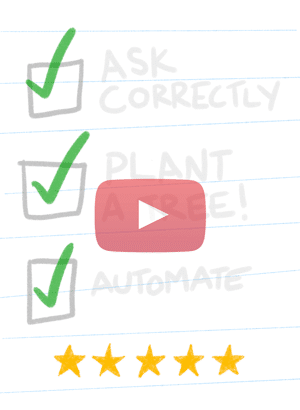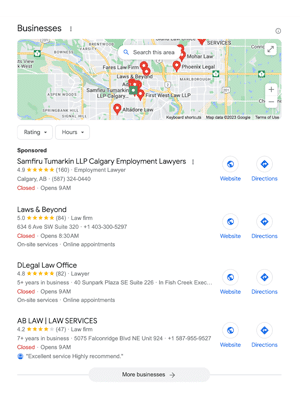“Can you leave us a review on Google?”
Or how about “Can you leave us a Yelp review?” These are questions you should never ask if you really want online reviews. Yes, that’s right … asking for online reviews is one of the WORST ways to get online reviews. Not to mention your online reviews are the most important piece of your digital identity and approaching them ham-handed by asking outright is simply a bad idea. Period.
Think about how important your reputation is
Most business people say their reputation is everything. You got your first clients because of your reputation. And you’ve gotten to where you are in business because you continued building yourself a good (or good enough) reputation.
Your reputation is everything; without it everything starts to go down hill fast. These days you don’t get a choice whether you participate in this whole “online reviews thing” because Google, Facebook, Yelp and many, many other sites make sure that your online reputation, true or not, is visible for the whole world to see.
Online reviews are now a new form of social currency with the ability to make some businesses rich – and the ability to shift market share away from those who have bad reviews or just plain don’t have enough reviews to keep up with their competitors.
The New Gold Rush: Online Reviews
This isn’t speculation, it’s official. Online reviews are the new gold rush as confirmed by Forbes, Nielsen, Harvard School of Business and University of California Berkeley.
Reviews influencing bottom line revenues is no fad. Many well respected media outlets and leading universities have established that the link between online reviews and increased revenues is durable. The jury is in and overwhelmingly shows that businesses who strategically move to get more online reviews are stealing market share away from their weaker competitors.
Weaker competitors who are either oblivious this “online review gold rush” is happening or have no idea how to implement a proper strategy of their own are losing market share to smart local entrepreneurs who “get it”; smart local entrepreneurs who might have missed other opportunities in the past but refuse to miss this boat.
When you think of the money being made from online reviews it makes perfect sense. More and more of us head online not just to buy products from Amazon or Ebay but also to research and buy our local services. We do this our computers at home and our mobile devices at street level.
Your good online reviews end up pre-selling your services for you, your negative online reviews warn people to stay the hell away from you.
In fact Nielsen – the world’s largest market research company used by practically every single Fortune 500 company – surveyed thousands of Americans in their “Global Trust in Advertising” survey and discovered that 70% of respondents said they trust Online Reviews.
The Worst Way to Ask for Reviews
When business leaders figure out they NEED online reviews that’s where the fumbling about usually begins. Most folks implement a knee jerk strategy titled “We need reviews! Let’s ask for them!” There’s very little thought to the language being used, no workable script, no Private Review Funnel or any kind of strategy beyond just awkwardly bumbling about asking for reviews.
They simply approach the problem of getting reviews by asking their clients:
“Can you leave us a review on Google? [or Facebook or Yelp etc.]”
Sound familiar? 9 times out of 10 this is super awkward and the WORST way to actually get reviews. Why? Because asking your clients “can you leave us an online review” is a massively loaded question.
“Can you leave us a review on Google?” implies you’re asking for a good review and everyone knows it. Because who in their right mind would ask if they wanted a negative review? When you ask people for a review it makes them uncomfortable because they know what’s really being asked is:
“Can you leave us a POSITIVE REVIEW on Google? [or Facebook or Yelp etc.]”
Awwwwwkwaaaaaard. As soon as the words are spoken, the implication of wanting a good review is immediately apparent and now there’s an elephant in the room. All of this is awkward for your staff and for your clients and using this old language to ask for reviews…
- Can be uncomfortable for you or your staff to ask
- Can be awkward for the person you just asked.
In fact, many employees have told us they feel “salesy” and even “sleezy” asking clients “for a review.” There’s a much better way to get reviews which you can find in our Swipe Files. There you’ll find the most up-to-date Language & Scripts we use with our Members to coach them on how to get more online reviews.
Old Language VS. New Language
Language matters to us humans. A lot. There’s an old crappy way to ask for reviews and a new better way to get reviews.
[table style=”simple”]
| OLD LANGUAGE | NEW LANGUAGE |
| Asking Customer for A Review | The New & Better Way |
| Loaded question | Open question |
| Implies you want a favorable opinion | Implies you want their honest opinion |
| Can makes staff feel “salesy” & uncomfortable | Makes staff feel more natural and comfortable |
| Can result in reviews that read forced & faked tone | Results in real reviews that read in an authentic tone of “voice” |
| Can result in less clients actually taking action | Can result in more clients taking action |
[/table]
The Exceptions
Like most things in life the best way to get reviews is not black and white. There are exceptions and in some cases we’ve found it does makes sense to directly ask for a review.
These exceptions all revolve around pre qualifying your potential reviewers such as:
If you’re in a low volume business such as real estate where (A) your transaction volume is very low and (B) you know exactly how happy people really are when you are completing the transaction
If you have a long standing relationship with a satisfied client who you know will sing your praises
In both those cases you’ve manually pre-qualified your clients, know they are satisfied and you can safely ask for a review.
A good example are Realtors, who as a profession average maybe 10 transactions per year.
Compare that to a busy Animal Hospital who do 10 transactions before the receptionist has even finished her first cup of coffee for the morning.

